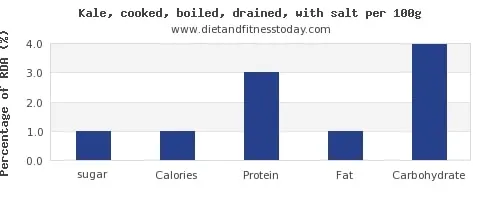Kale is a highly nutritious and beneficial vegetable for you to eat! You can cook it, make a salad or a smoothie – but you should definitely try to incorporate it into our regular diet! Your body will be thankful!
What about your pet? Can dogs eat kale too? Is it good for them or not?
We know that most pet owners often feel tempted to feed their beloved animals right off their dinner plates. Who can resist their sad look, right? However, sometimes giving them your food is not doing them a favor.
Not everything we eat is good for our dogs as well. In fact, the list of “human” food that our dogs should not consume is quite long. Let’s check if kale is on it!

Kale Defined
Kale (Brassica oleracea acephala) is a member of a big family called Brassicaceae, also known as a mustard family. It has many close relatives, including Brussel sprouts, radishes, and a good old cabbage.
What Does Kale Look Like?
In case you have never seen kale – it is dark green and leafy, a little bit like cabbage, just not so dense. The leaves are curled and finely incised.
Why Is Kale Good For You?
Kale is considered a superfood as it is packed with vital nutrients and offers a range of health benefits for your entire body.
- It helps manage your blood pressure.
- It supports your heart health.
- It boosts your digestion.
- It lowers the risk of cancer.
- It protects from type 2 diabetes.
- It plays a role in healthy bone formation.
- It keeps your skin and hair healthy and good-looking.
What Makes Kale So Beneficial?
Kale is rich in fiber and antioxidants that help remove all the harmful toxins from your body. It is also rich in vitamins C and K, as well as calcium, phosphorus, and iron.
Chlorophyll in kale prevents the absorption of heterocyclic amines – harmful chemicals that we consume when eating meat grilled at a high temperature. Beta-carotene is also there – it is crucial for the production of vitamin A your body needs to grow and maintain its tissues.

Kale is low in calories, sugar, and fat, and high in protein, making it ideal for a weight-loss diet. It can help you maintain a healthy weight too.

What Does Kale Taste Like?
Kale has dry and crunchy leaves. They have a tough structure and equally strong taste. The flavor can best be described as earthy. It is not spicy at all but can sometimes taste a bit bitter.
It is best to choose young kale since it has softer and mild-tasting leaves. You can make a salad from young and fresh kale and lettuce or even use only kale cut in small ribbons.
On the other hand, old kale often has a bitter taste and tougher leaves you’ll have trouble chewing. If kale is old or it is not fresh, you should better cook it before serving or eating it.
Different varieties of kale taste differently as well. For example, the Red Russian kale tastes the sweetest of all the kale varieties out there.
A Few Interesting Facts About Kale
Kale that has grown through the frost tastes sweeter. Some say kale will taste best if you harvest it after the first frost.
It used to be called peasant’s cabbage.
Kale was popular in Europe in Roman times, but it took a while for it to arrive in the U.S. in the 17th century.

Can Dogs Eat Kale Or Not?
We have determined that kale is a superfood for us humans, but what about our beloved furry friends? Can they eat kale too? The answer is a bit complicated.
You can find numerous articles on the internet raving about how beneficial kale can be for your dog. Still, the American Kennel Klub warns about medical problems your pet can have if you feed him kale.
The main problem is that most of the articles that recommend giving kale to dogs lack veterinary sources to back up such a claim. Mara Ratnofsky, DVM General Medicine, at Angell Animal Medical Center, made a list of human food you should avoid giving to your dog. Kale is on that list.
She advises that we should keep our pets away from kale. Namely, kale is high in calcium oxalate, which can cause health problems such as kidney and bladder stones. These issues can sometimes be treated at home with proper medication, but in some cases, a dog can require hospitalization and supportive care to recover. The experience can be quite traumatic for your dog, and the treatment procedure will be costly as well.
So, next time you feel tempted to give your dog a kale rib as a tasty treat, you should better think it over. Since our four-legged friends are prone to kidney or bladder stones, they should avoid all foods that contain calcium oxalate. As far s veggies are concerned you should avoid giving your pet the following:
- Spinach
- Beet greens and roots
- Swiss chard
- Collards
- Parsley
- Leeks
According to veterinarian Mara Ratnofsky, Isothiocyanates are also found in kale and can cause mild or even severe gastric problems when given to dogs. Small amounts of kale should not be dangerous, but if you give your dog kale treats regularly you increase the risk of irritating its digestive system and making him uncomfortable or sick.
Large breeds of dogs may not be that much at risk, but small or toy breed dogs can be in danger when you give them as little as a few kale stalks.
Kale is known to interfere with thyroid function when consumed often or in large amounts. It can be a danger for both humans and dogs. If your dog is on medications and it already suffers from hypothyroidism, there is a risk of medication interactions if you give him kale too often. There are many similar human food-related medication interactions, and you should thus best consult your veterinarian before feeding any table scraps to your dog.
What Should You Do If Your Dog Eats Too Much Kale?
You cannot keep an eye on your dog constantly, and sometimes it can eat something it shouldn’t. Dogs often snap up fallen food before you can even react, or they break into a trash can or your garden and enjoy a leafy green snack before you have the time to stop them.
If your dog eats a good portion of kale, you should keep him monitored for a while to see if you can notice any signs of intestinal upset or symptoms of kidney and bladder stones.
What are the alarming symptoms that indicate your dog could be suffering from these conditions? Those are:
- Vomiting
- Diarrhea
- Difficulty urinating
- Change in urination habits
If you notice any of these signs, take your dog to the veterinarian as soon as possible.
Is A Small Amount Of Kale Safe For Your Dog?
A small amount of kale will most likely be harmless for your dog. It largely depends on your dog’s size too. Logically, if you have a German shepherd, it will not be sick from a few kale stalks, but a small terrier can have problems with that. Besides, not all dogs react in the same way; some are more sensitive than others.
It is always best to consult your veterinarian with any food-related concerns you may have. The veterinarian who takes care of your dog will know whether your pet has any underlying medical issues or concerns that could increase the risk of any disease.
The bottom line is that you should not give your beloved pet kale as a regular treat or make it a part of its daily diet. There are alternative options if you want to include vegetables in your dog’s diet. For example, your dog can enjoy carrots or peas without any risk of health problems. Your veterinarian will certainly have to say a lot on this subject and recommend numerous alternative healthy treats for your furry companion.

Conclusion
Before you give kale or any other vegetable to your dog, you should consult a veterinarian. There are many different opinions on this matter, but a veterinarian that knows your dog is the only one who can tell you whether or not you should feed something to your dog.
Veggies can sometimes help control your pet’s weight or add valuable nutrients to his or her diet. Still, kale is not the best option for optimal nutrition or as a regular treat.
Small amounts of kale are safe for your dog, but it is often hard to assess how much of it you should give to your pet, especially if it is a small breed dog. Some dogs have extremely sensitive stomachs too, and should thus avoid kale altogether.
You should not panic if the dog accidentally eats a kale stalk, though. A little bit of kale from time to time should not cause any serious issues.
Learn More: What Can Dogs Eat? A Comprehensive List Of Dog-safe Foods

